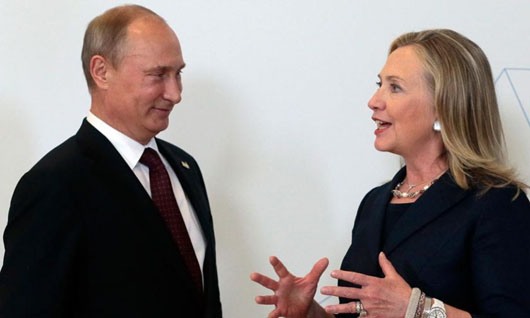by WorldTribune Staff, February 8, 2018
In written testimony to three congressional committees, an FBI informant said that, amid Moscow’s pursuit of the Uranium One deal, Russian nuclear officials earmarked millions of dollars for the Clinton Foundation around the same time then-Secretary of State Hillary Clinton was promising a U.S. “reset” with Russia, a report said.
The Hill, which obtained the testimony of informant Douglas Campbell, reported on Feb. 7 Campbell “was told by Russian nuclear executives that Moscow had hired the American lobbying firm APCO Worldwide specifically because it was in position to influence the Obama administration, and more specifically Hillary Clinton.”
 The Uranium One deal, approved in 2010 by the Committee on Foreign Investment in the United States (CFIUS), gave Russian mining giant Rosatom control of roughly 20 percent of America’s uranium.
The Uranium One deal, approved in 2010 by the Committee on Foreign Investment in the United States (CFIUS), gave Russian mining giant Rosatom control of roughly 20 percent of America’s uranium.
Department of Justice spokeswoman Sarah Isgur Flores earlier told the Hill that a deal was reached in late October, which permitted the informant to talk to Congress for the first time — almost eight years after he first went undercover.
Campbell said in his testimony that Russian nuclear officials “told me at various times that they expected APCO to apply a portion of the $3 million annual lobbying fee it was receiving from the Russians to provide in-kind support for the Clinton’s Global Initiative.”
“The contract called for four payments of $750,000 over twelve months. APCO was expected to give assistance free of charge to the Clinton Global Initiative as part of their effort to create a favorable environment to ensure the Obama administration made affirmative decisions on everything from Uranium One to the U.S.-Russia Civilian Nuclear Cooperation agreement,” Campbell said.
The CFIUS has the power to block deals deemed a threat to U.S. national security and Campbell said he asked his FBI handlers why the U.S. was not more aggressive in doing so.
“I expressed these concerns repeatedly to my FBI handlers. The response I got was that politics was somehow involved,” Campbell said.
Campbell said in his written testimony: “The Russians expressed a sense of urgency to secure new U.S. uranium business because they knew that the two-decades-old “Megatons to Megawatts” program would cease in 2013. Then Russia would no longer be guaranteed a market to sell recycled nuclear warhead materials as peaceful reactor fuel in the United States. I gathered evidence for the FBI by moving closer and closer to the Russians’ key nuclear industry players, including those inside the United States and high-ranking Russian officials who would visit.”
Campbell continued: “I was speechless and angry in October 2010 when CFIUS approved the Uranium One sale to Rosatom. …I remember one response I got from an agent when I asked how it was possible CFIUS would approve the Uranium One sale when the FBI could prove Rosatom was engaged in criminal conduct. His answer: ‘Ask your politics.’ ”
Meanwhile, investigative reporter Sara Carter obtained an April 16, 2010 summary brief provided to Campbell’s former FBI handlers in which Campbell “stressed his deep concerns about Tenex, a wholly owned subsidiary of the Russian state nuclear arm, Rosatom and its ongoing work to provide Iran with the technology needed for its nuclear reactor program.”
Campbell said Russia provided the resources necessary for Iran’s nuclear reactors, despite promises that they were not sharing such technology with Iran, Carter’s report said.
“TENEX continues to supply Iran with fuel through their Russian company TVEL,” stated Campbell in the 2010 brief. TVEL is a Russian nuclear fuel cycle company headquartered in Moscow. “They (TVEL) continue to assist with construction consult and fabricated assemblies to supply the reactor. Fabricated assemblies require sophisticated engineering and are arranged inside the reactor with the help and consult of TVEL.”
Subscribe to Geostrategy-Direct __________ Support Free Press Foundation
